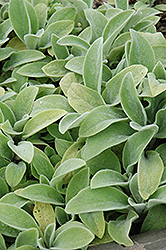Plant Height: 12 inches
Flower Height: 24 inches
Spacing: 15 inches
Sunlight:
![]()
![]()
Hardiness Zone: 2b
Description:
A truly elegant variation of lamb's ears; foliage emerges a pale blue-green, but sun exposure turns them a pale yellow green with lovely silver flocking; lovely whorls of pink flowers occasionally arise on footlong stems; a perfect edging for the border
Ornamental Features
Primrose Heron Lamb's Ears's attractive large tomentose oval leaves emerge bluish-green in spring, turning chartreuse in colour with hints of gold throughout the season on a plant with a mounded habit of growth. It has masses of beautiful spikes of shell pink flowers rising above the foliage in early summer, which are most effective when planted in groupings.
Landscape Attributes
Primrose Heron Lamb's Ears is a dense herbaceous perennial with a mounded form. Its relatively coarse texture can be used to stand it apart from other garden plants with finer foliage.
This is a high maintenance plant that will require regular care and upkeep, and should only be pruned after flowering to avoid removing any of the current season's flowers. It is a good choice for attracting bees to your yard, but is not particularly attractive to deer who tend to leave it alone in favor of tastier treats. Gardeners should be aware of the following characteristic(s) that may warrant special consideration;
- Spreading
Primrose Heron Lamb's Ears is recommended for the following landscape applications;
- Mass Planting
- Border Edging
- General Garden Use
- Groundcover
- Container Planting
Planting & Growing
Primrose Heron Lamb's Ears will grow to be about 12 inches tall at maturity extending to 24 inches tall with the flowers, with a spread of 18 inches. When grown in masses or used as a bedding plant, individual plants should be spaced approximately 15 inches apart. Its foliage tends to remain dense right to the ground, not requiring facer plants in front. It grows at a fast rate, and under ideal conditions can be expected to live for approximately 10 years. As an herbaceous perennial, this plant will usually die back to the crown each winter, and will regrow from the base each spring. Be careful not to disturb the crown in late winter when it may not be readily seen!
This plant does best in full sun to partial shade. It prefers to grow in average to dry locations, and dislikes excessive moisture. It is not particular as to soil type or pH. It is highly tolerant of urban pollution and will even thrive in inner city environments. This is a selected variety of a species not originally from North America. It can be propagated by division; however, as a cultivated variety, be aware that it may be subject to certain restrictions or prohibitions on propagation.
Primrose Heron Lamb's Ears is a fine choice for the garden, but it is also a good selection for planting in outdoor pots and containers. It can be used either as 'filler' or as a 'thriller' in the 'spiller-thriller-filler' container combination, depending on the height and form of the other plants used in the container planting. Note that when growing plants in outdoor containers and baskets, they may require more frequent waterings than they would in the yard or garden.
Disclaimer - This resource is provided for informational purposes only and does NOT reflect current availability. Inventory varies seasonally, so we cannot guarantee that every plant will be in stock at all times - please contact your favourite GardenWorks location directly for current availability. It does not include our entire inventory of plants, so be sure to visit GardenWorks to see varieties that may not be represented on this list.

